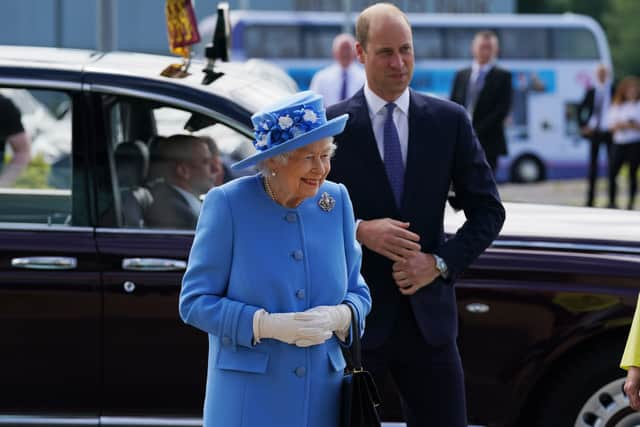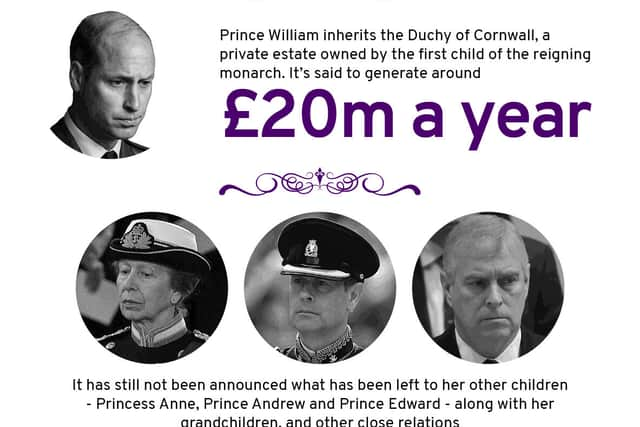What will Prince William inherit from the Queen? Monarch’s will explained and who will inherit from her
This article contains affiliate links. We may earn a small commission on items purchased through this article, but that does not affect our editorial judgement.
and live on Freeview channel 276
There are lots of questions that have been asked since the death of the Queen, but two of those questions - what is in the Queen’s will and just what will each member of the royal family inherit - may be hard to answer.
Queen Elizabeth II died at Balmoral Castle on Thursday 8 September and was immediately succeeded to the throne by her eldest son, Charles, who has become King Charles III.
Advertisement
Hide AdAdvertisement
Hide AdSo, just what do we know about what’s in the Queen’s will, who will inherit from her and what will they inherit?
Here’s what we know.


What is in the Queen’s will?
What is in the Queen’s will is a closely guarded secret, and the public may never know what’s in it - or at least not for a very long time.
For complicated legal reasons, which in simple terms come down to the fact that the late Queen was the source of legal authority, her will does not have to be granted probate.
That means it, unlike all other wills, hers does not have to be published.
Advertisement
Hide AdAdvertisement
Hide AdThe wills of every member of the royal family is actually protected, which means they don’t have to be available to the public.
It has been a convention for over a century that the courts are asked, after the death of a senior member of the royal family, to seal their wills
There was a legal battle over Princess Margaret’s will, when the Queen’s younger sister died in February 2002.
The court was told: “The primary reason and purpose of sealing royal wills is to protect the privacy of the sovereign.”
Advertisement
Hide AdAdvertisement
Hide AdIn 2021, after Prince Philip’s death, the High Court ruled that the Duke of Edinburgh’s will is to remain secret for at least 90 years to protect the “dignity and standing” of the Queen.
This was a big change, however, as prior to this royal wills remained sealed indefinitely.
But Sir Andrew McFarlane, the most senior judge in the family courts, ruled that after 90 years there will be a private process in nine decades to decide if his will can be unsealed. As Prince Philip died in 2021, this means his will may be read in 2111.
The Queen’s will is said to be in a category of its own which may mean it does not ever have to be published.
How much is the Queen worth?
Advertisement
Hide AdAdvertisement
Hide AdIn 2015, The Sunday Times Rich List calculated the late Queen’s wealth at £340 million.
Many reports of the late monarch’s supposed wealth may have overestimated the figure, as many sources of her wealth, such as the palaces, the Crown Jewels and the collections of works of art, were not actually her private property but held in trust for future generations.
The main source of the sovereign’s personal money is the Duchy of Lancaster, the sovereign’s private estate.
In the financial year ending 31 March 2022 it was valued at about £652 million, and generated a net surplus of £24 million.
Advertisement
Hide AdAdvertisement
Hide AdAs it is an asset of the Crown that can not be given to anyone else, it would not even appear in the Queen’s will.
Instead, the estate is simply passed from sovereign to sovereign, without any tax being paid. This means the estate now belongs to King Charles II and in future will belong to his eldest son Prince William, and then his eldest son Prince George, as per the royal line of succession.
No tax is paid on the estate because of a deal the Queen struck with John Major’s government in 1993, in which the late monarch agreed for the first time to pay income tax.
As part of that agreement, however, it was stipulated that sovereign-to-sovereign bequests would be exempt from inheritance tax.


Who will inherit things from the Queen?
Advertisement
Hide AdAdvertisement
Hide AdEven though the Queen’s will won’t be made public, or at least not in the lifetime of most people, there are some things we can safely assume about it - such as who will be included in it.
As we know, King Charles III has now inherited the Duchy of Lancaster. The Crown Estate’s property, including Buckingham Palace, Windsor Castle, Holyrood Palace, and a variety of other items including the Crown jewels, an art collection, and archives, will also remain the property of the reigning King Charles as these things are passed from monarch to monarch.
It has still not been announced what the Queen has left to her other children; Princess Anne, Prince Andrew and Prince Edward, along with her grandchildren, and other close relations such as her children and grandchildren’s partners and children.
We may not know exactly what Her Majesty has chosen to leave to other members of her family, unless Buckingham Palace decides to announce this.
Advertisement
Hide AdAdvertisement
Hide AdWith time, however, people will start to notice which descendants of the late Queen have inherited her jewellery as these items will be worn at official events.
What will Prince William inherit from the Queen?
Now that King Charles has taken the throne that means that his eldest on Prince William, who is now the heir to the throne, will inherit the Duchy of Cornwall.
This is a private estate always owned by the first child of the reigning monarch. Founded in 1337, it covers 135,000 acres in England and manages all the area’s landholdings and is said to generate around £20million in private income a year.
Comment Guidelines
National World encourages reader discussion on our stories. User feedback, insights and back-and-forth exchanges add a rich layer of context to reporting. Please review our Community Guidelines before commenting.
